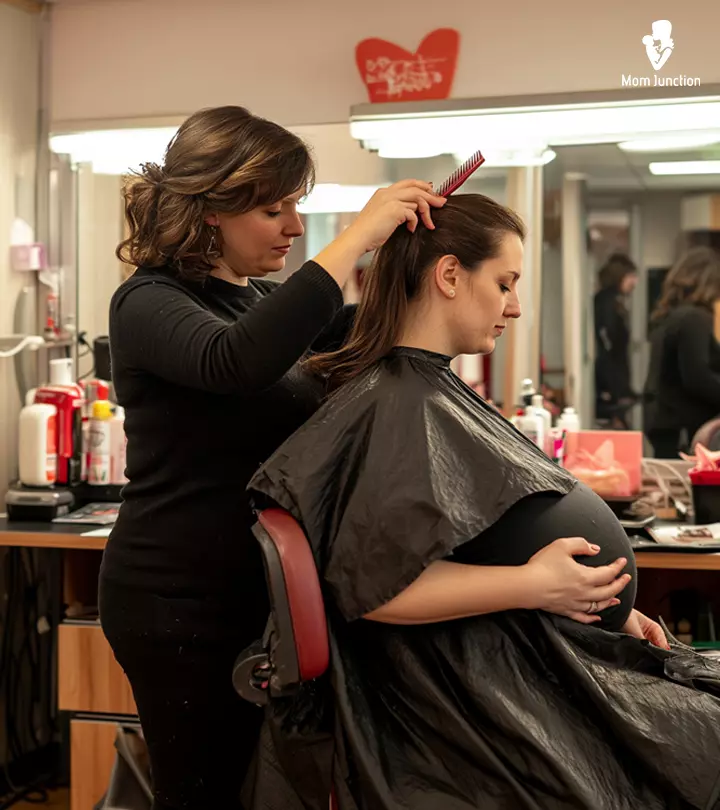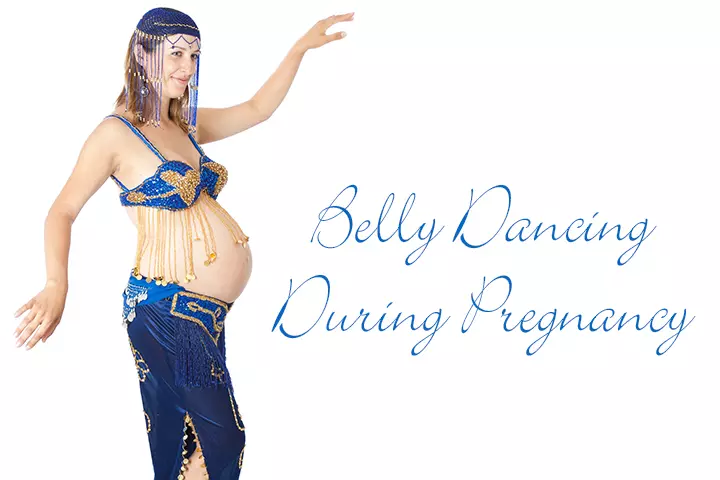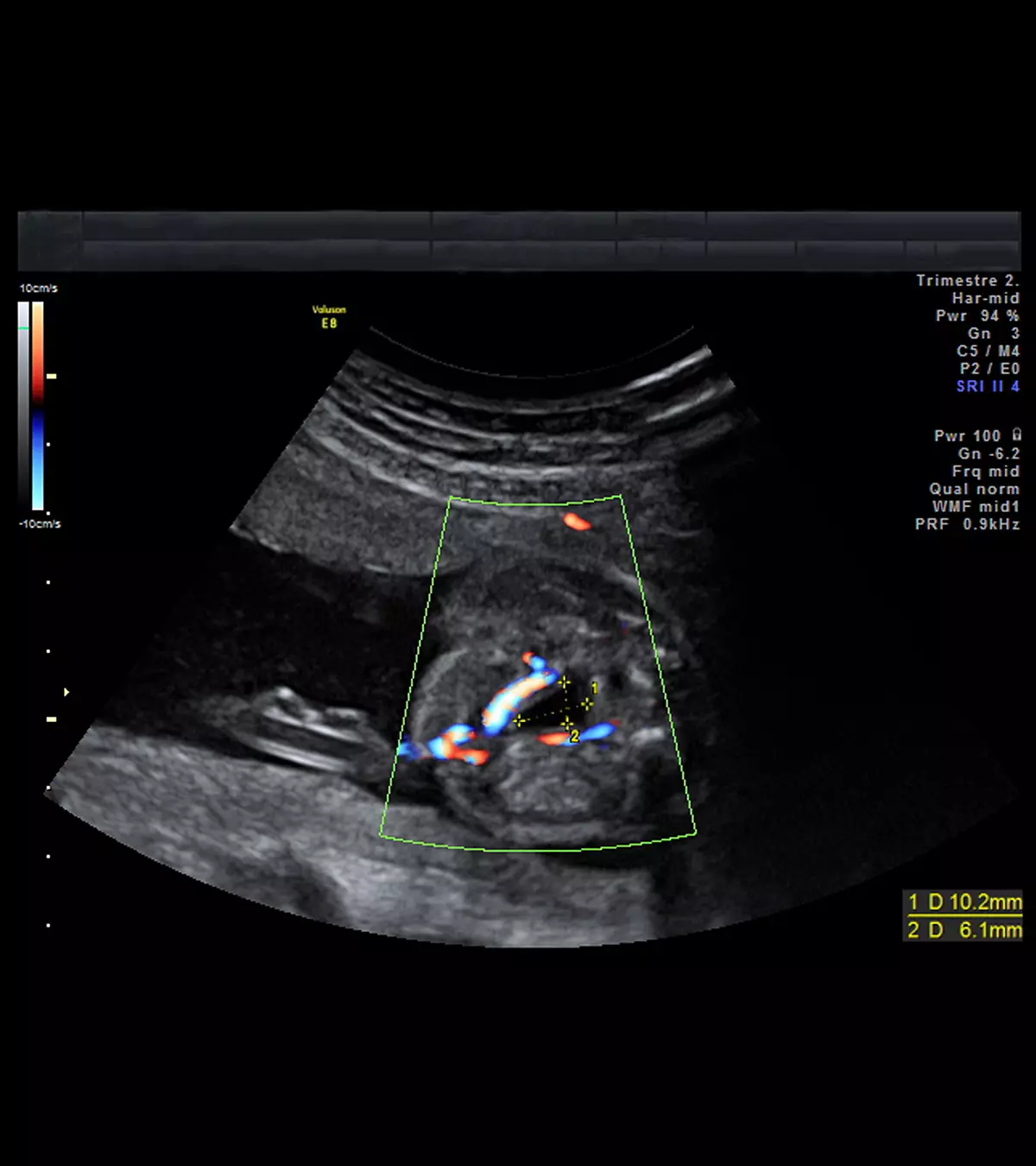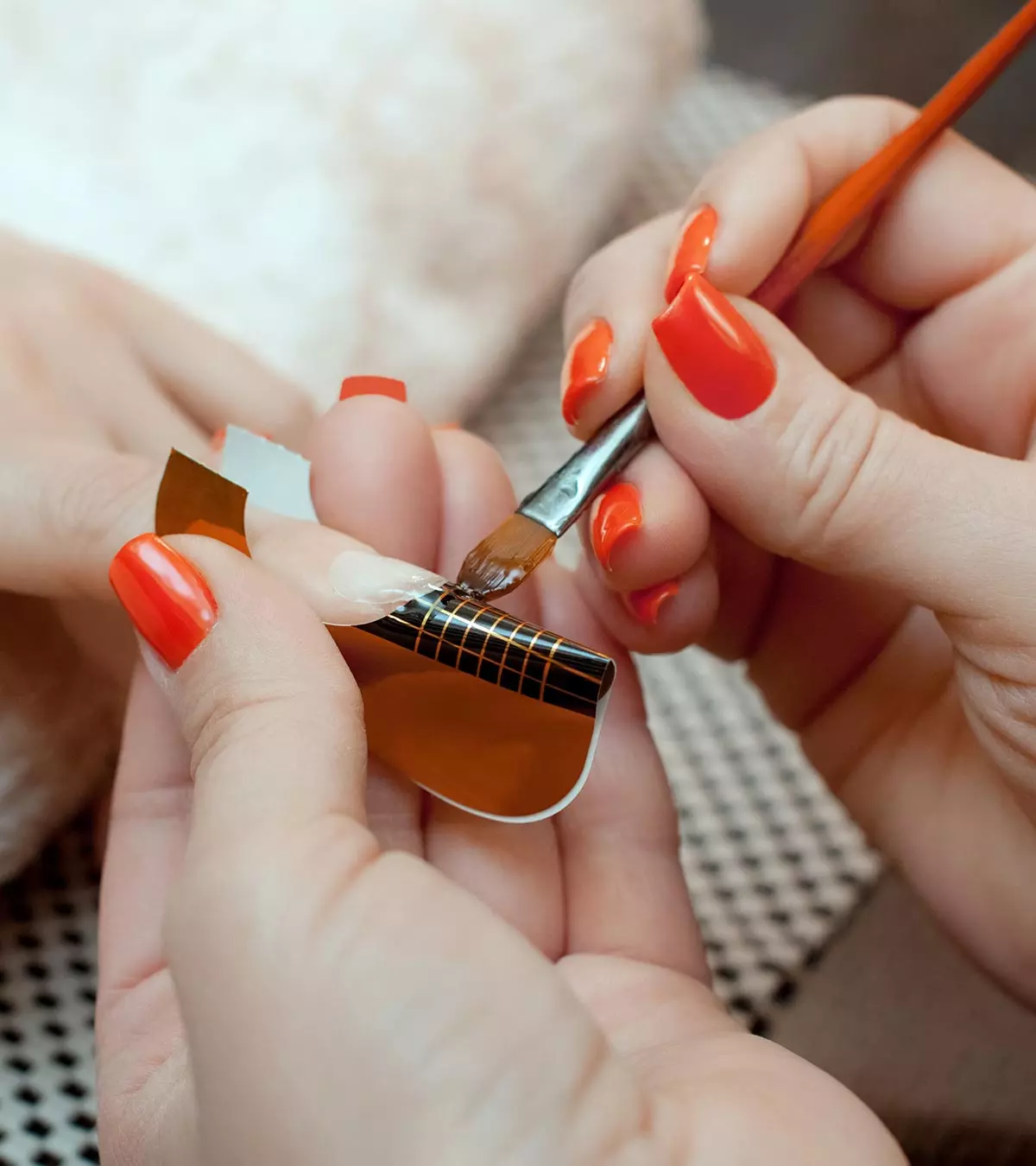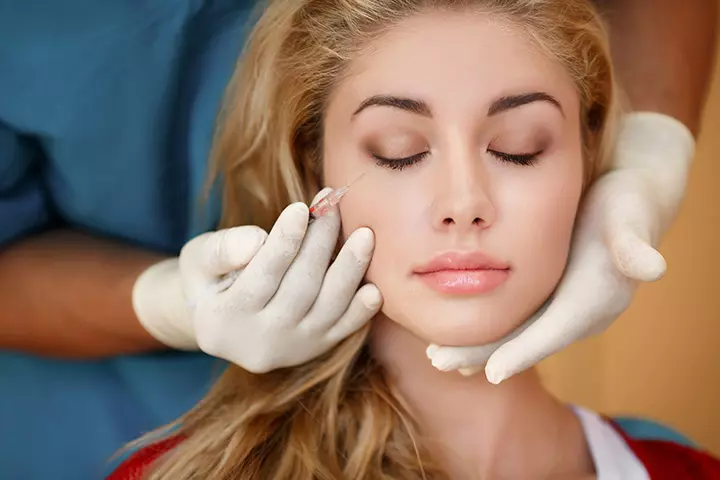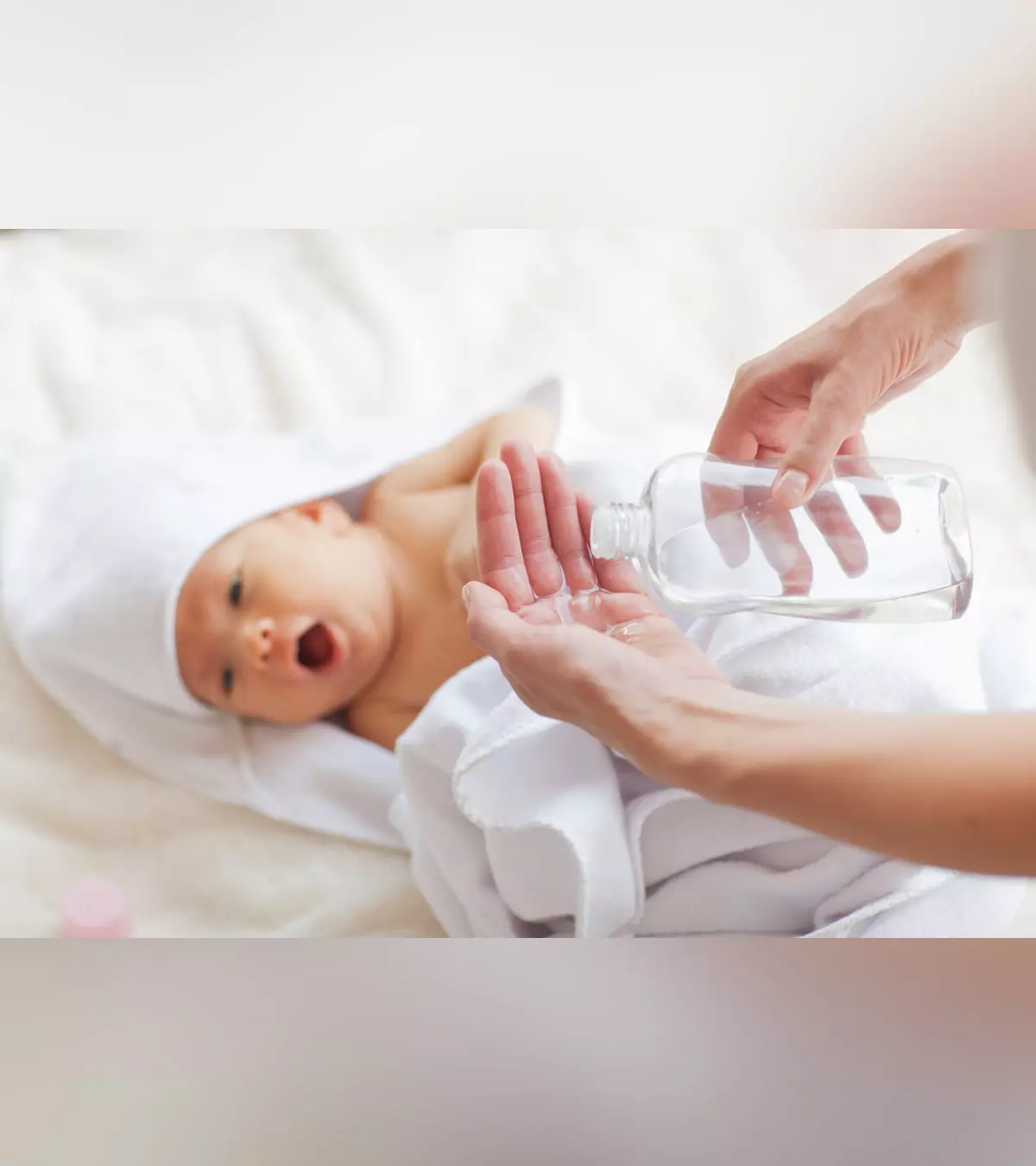
Some parents may be concerned about the safety of using mineral oil for babies. Mineral oil, base oil, or lubricant base oil is a colorless and odorless substance obtained as a distillation product of crude petroleum oil. It comes in varying qualities and grades depending on the refining process.
Cosmetic-grade mineral oil is used to prepare cosmetic products for adults and babies mainly because of its moisturizing properties. In fact, most commercial baby oils are mineral oils with added fragrance. Parents have been using mineral oil-containing baby products for ages now. However, it comes under frequent scrutiny, raising concerns about its safety for babies.
This post aims to answer your queries about the safety of mineral oil, its uses and side effects, and precautions to take when using it on babies.
Is Mineral Oil Safe For Babies?
When used appropriately, mineral oil’s topical application is likely safe for newborns and older babies. Research shows that mineral oil works as a stable emollientiA liquid or cream that helps soften the skin and reduce pain. that promotes the skin’s barrier and moisturizes it by reducing trans-epidermal water lossiThe water that evaporates from the inner layers of the skin to the environment (TEWL) (1) (2). However, its improper use or overuse could lead to adverse effects, such as skin irritation and rashes.
Consult a pediatrician before using mineral oil as they can guide you about its appropriate use for babies. Oral use of mineral oil for children is not advisable (3).
Key Pointers
- If used in appropriate amounts, topical application of mineral oil is not harmful in babies, and it acts as an emollient and protects their skin. Intake of mineral oil is not recommended for babies.
- Mineral oils are often used for a baby massage before bathing and treat certain skin conditions such as eczema.
- Mineral oils can cause adverse effects, such as allergic reactions or acne, in some babies, so you must use them cautiously as per the doctor’s recommendations.
How Is Mineral Oil Used For Babies?
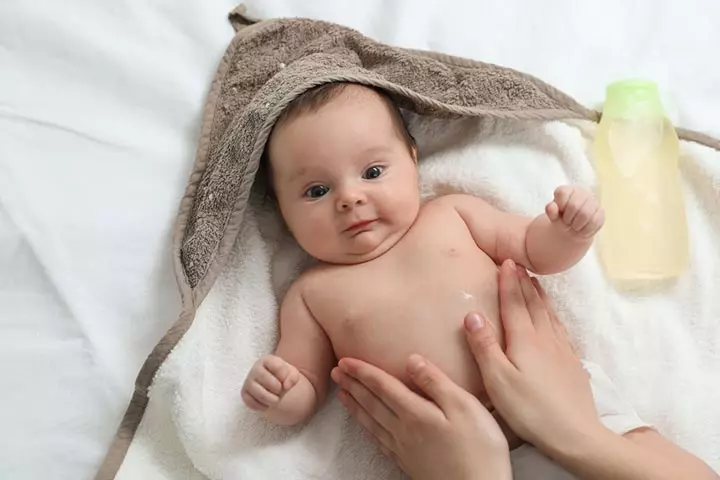
Image: Shutterstock
Topical application of mineral oil on the babies’ body and hair is common. Several parents and caregivers use mineral oil to massage babies before bathing as a part of baby skin care. Experts recommend applying mineral oil on the baby’s body after bath to retain moisture and treat/manage skin conditions, such as eczemaiA skin condition that causes dryness, itchiness, and inflammation of the skin. (4) (5). Applying mineral oil an hour before shampooing could help alleviate cradle capiA common, harmless skin condition that causes rough or irregular patches on the baby’s scalp by loosening the dry scales (6).
However, not all these uses are always effective and recommended. For instance, the American Academy of Pediatrics (AAP) notes that mineral oils for baby skin are “not very helpful or unnecessary” to treat or manage cradle cap (7). Similarly, some home remedies in alternative medicine use mineral oil to manage infantile colic. However, scientific evidence supporting this use is sparse. Thus, it is advisable to first discuss your intent of mineral oil use with a pediatrician.
Are There Any Side Effects Of Using Mineral Oil For Babies?

Image: Shutterstock
The topical use of mineral oil may cause the following side effects in babies.
- Allergic reaction: In rare instances, the use of mineral oil as a moisturizer could cause allergic reactions in sensitive babies. Red, itchy rashes and swelling are some common signs of an allergic reaction. Therefore, you must always monitor your baby’s skin after applying mineral oil and discontinue its use if you see any adverse reactions.
- Acne: Cosmetic-grade mineral oil is non-comedogenic, meaning it does not clog the pores (8). But, some individuals have reported breakouts and acne after using mineral oil on their skin. Babies with sensitive skin may display this side effect, as well.
Unless the baby has sensitive skin, the topical use of mineral oil under pediatric guidance is generally safe.
Yet, you can follow some precautions for extra safety.
Precautions To Take While Using Mineral Oil For Babies

Image: Shutterstock
Observing the following precautionary measures can let you use mineral oil safely on your baby’s skin.
- Buy pure mineral oil from a reputable and trustworthy manufacturer and seller or pharmacy.
- Use the product as directed. Consult your doctor if you are unsure about the appropriate use of mineral oil for baby skincare.
- Check the label carefully to determine if the product contains additives.
- Avoid overusing mineral oil and apply it only as many times as told by the doctor.
- Do not apply mineral oil around the eyes, nose, and mouth. Mineral oil inhalation may cause respiratory issues, and accidental ingestion could have adverse effects, such as abdominal cramps and nausea.
 Caution
Caution- Unless directed by a doctor, prefer applying mineral oil before the baby’s bath. It will let you wash away the oil from the baby’s body and scalp. Letting mineral oil sit on the skin for too long may worsen some skin conditions, such as cradle cap. If the baby has eczema or very dry skin, you may apply mineral oil post-bath after seeking a doctor’s approval.
Frequently Asked Questions
1. Is it safe to give toddlers mineral oil for constipation?
Mineral oil has laxative effects. It has been used to treat constipation for ages to alleviate gastrointestinal issues and maintain digestive health. While using mineral oil may help relieve constipation and is generally considered safe for adults, experts recommend against its use for children under six years (9). Hence, consult your healthcare provider before administering mineral oil to your toddler as a stool softener.
2. Is mineral oil harmful to babies?
The topical application of mineral oil is likely safe for babies. However, its oral intake should be avoided for children under six years unless directed by a doctor (9). According to experts, if needed, mineral oil enema can be administered to children aged two years and above (10). However, do so only after seeking pediatric guidance.
3. Is mineral oil good for diaper rash?
Mineral oil has emollient properties and can moisturize the skin (1) (2). Perhaps that’s why mineral oil is often found in diaper rash medicines (11). So, if you are keen on using mineral oil for your baby or toddler’s diaper rash, do so after consulting your doctor for safe and appropriate baby care.
4. What are the safer alternatives to mineral oil for babies?
Some natural oils, like coconut oil, olive oil, and shea butter, provide moisturizing benefits as mineral oil. They are considered safe for most infants, but do apply them to a small section of the skin for a patch test when using them for the first time and check for any allergic reactions.
Mineral oil is applied to the baby’s body and scalp after bathing. Hence, it is natural for you to be concerned about the safety of mineral oil for babies. This oil could lead to allergic reactions or acne in babies. Therefore, consult a pediatric care expert before using mineral oil for babies. Purchase pure mineral oil and check the ingredients for any additives. Also, seek your doctor’s advice on the right time to use the oil. Finally, conduct a patch test and continue using the oil only if your baby tolerates it.
Infographic: How Does Coconut Oil Compare With Mineral Oil For Baby Massage?
Parents may be concerned about using mineral oil on their baby’s skin and may look for natural alternatives. Many natural oils such as coconut oil, mustard oil, and sesame oil have emerged as potentially beneficial massage oils for babies. The infographic below compares mineral oil to coconut oil for baby skin. Illustration: Momjunction Design Team
Illustration: Mineral Oil For Babies: Safety How To Use And Side Effects

Image: Dall·E/MomJunction Design Team
References
1. Lorena S. Telofski et al.; The Infant Skin Barrier: Can We Preserve, Protect, and Enhance the Barrier?; NCBI
2. A. V. Rawlings and K. J. Lombard; A review on the extensive skin benefits of mineral oil; Wiley Online Library
3. Mineral oil (oral/rectal); C.S. Mott Children’s Hospital
4. What We Know Today About Applying Oils To Newborn Skin; Dermatology Education Foundation
5. Baby massage: tips and benefits; NCT
6. Cradle Cap; University of Michigan
7. Cradle Cap; Healthy Children; AAP
8. Mineral Oil; Chemical Safety Facts
9. Mineral Oil – Oral; British Columbia
10. Enemas: How to Give; Tufts Medical Center
11. Mineral oil overdose; Mount Sinai
12. Michael Weinstein; First do no harm: The dangers of mineral oil; NIH
Community Experiences
Join the conversation and become a part of our nurturing community! Share your stories, experiences, and insights to connect with fellow parents.
Read full bio of Dr. Richard Mario Lurshay
Read full bio of Swati Patwal
Read full bio of Rohit Garoo
Read full bio of Ghazia Shah






